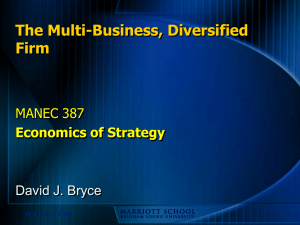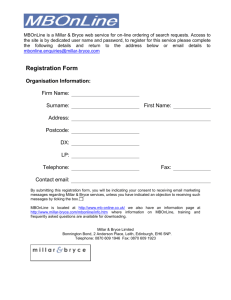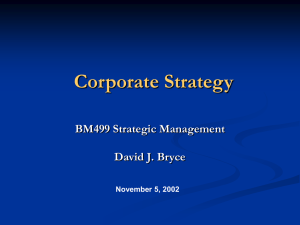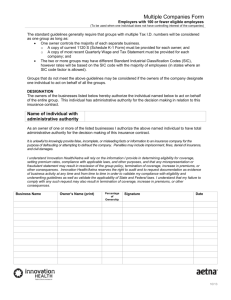The Power of Buyers, Suppliers and Substitutes The Economics of
advertisement
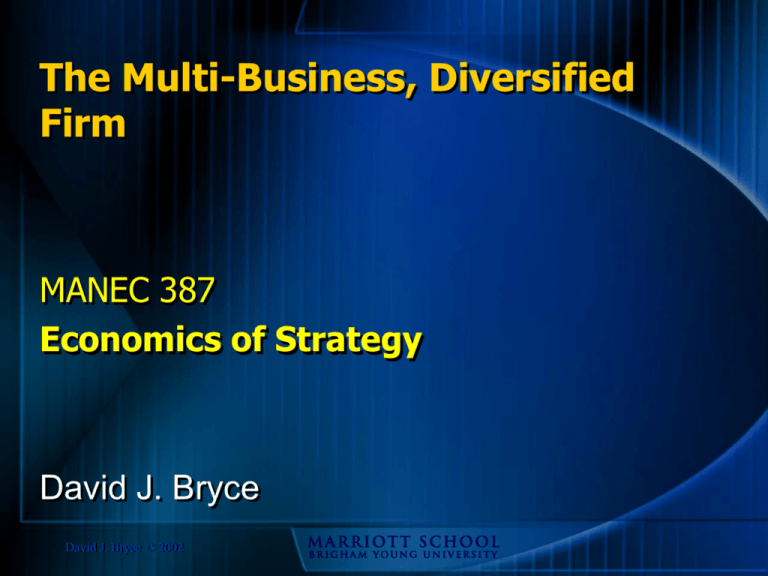
The Multi-Business, Diversified Firm MANEC 387 Economics of Strategy David J. Bryce David J. Bryce © 2002 Corporate vs. Business Unit Strategy • Business Unit Strategy – To whom will we sell, for what price? – How will we source, manufacture, distribute, etc. our product? • Corporate Strategy – What business(es) should we be in? – How will we get in (or out) of them? – How will we coordinate or integrate businesses to create value? David J. Bryce © 2002 Adapted from M. Porter, 2001, HBR Corporate-Level Strategy and the Multi-business Firm • Corporate strategy is action taken to gain competitive advantage through multiple business units • Value is created through the configuration and coordination of multi-business activities David J. Bryce © 2002 Scope of the Firm “Horizontal Integration” output-products Prod./Ind. A Prod./Ind. B Prod./Ind. C Sales Sales Sales Distrib Distrib Distrib Manuf. Manuf. Manuf. ... Input-products “Vertical Integration” Vertical Scope Horizontal Scope Sales Sales Distrib Distrib Distrib Manuf. Manuf. Manuf. ... David J. Bryce © 2002 Sales Wal-mart Prod./Ind. A Prod./Ind. B Prod./Ind. C Sales Sales Sales Distrib Distrib Distrib Manuf. Manuf. Manuf. ... Input-products Vertical Scope output-products Horizontal Scope Sales Sales Sales Distrib Distrib Distrib Manuf. Manuf. Manuf. ... David J. Bryce © 2002 GE Horizontal Scope Aircraft Engines Prod./Ind. C Sales Sales Sales Distrib Distrib Distrib Manuf. Compressors Sales Manuf. Manuf. Sales Sales Distrib Distrib Distrib Manuf. Manuf. Manuf. Input-products Vertical Scope output-products Refrigerators ... ... David J. Bryce © 2002 Why Diversify? • Secure Market Power – Cross-subsidization, mutual forbearance, reciprocal buying – Shown to be an incomplete, if not an incorrect view • Mitigate Business (Cycle) Risk – Perspective from finance – Few firms are just “portfolio” investors David J. Bryce © 2002 Why Diversify? • Achieve Efficiency (or “Synergy”) – Pursue related or complementary activities – Most common type of diversification – Associated with higher levels of performance than previous two types • Dynamic Learning – Related to the efficiency motivation – Firms invest in activities that leverage existing skills and knowledge – Firms introduce new activities to build skills and knowledge – Objective is to develop a “capabilities portfolio” that is ready for new opportunities when they emerge David J. Bryce © 2002 How to Choose Industries/Products for Expansion 1. Strategically Important 2. Strategically Related; i.e. commonality in one of the following: 1. 2. 3. 4. 5. Customers Channels Inputs Processes Market Knowledge David J. Bryce © 2002 Sequential Entry and Dynamic Learning: Example Texas Texas Instruments Instruments Semiconductors (3674) Electronic Computers (3571) Software (7372) Search & Navigation (3812) Electronic Computers (3571) IBM IBM Computer Storage Devices (3572) Computer Terminals (3575) Computer Peripherals (3577) Source: COMPUSTAT Business Segment Files, 1977-1996 David J. Bryce © 2002 Software (7372) Semi-conductors (3674) Patterns of Historic Entry in Industries Related to Semiconductors, 1977-1996 Process Control Instruments (3823) Search & Navigation Equip. (3812) * Radio/TV Communication Equip (3663) Electronic Capacitors (3675) Printed Circuit Boards (3672) David J. Bryce © 2002 Computer Peripherals (3577) * Semiconductors (3674) * Engineering Services (8711) * p<0.10 * Electronic Components (3679) Computer Storage Devices (3572) Special Industries Machinery (3559) Patent Owners & Lessors (6794) A General Inter-industry Relatedness Index Index available for download at http://msm.byu.edu/strategy/bryce/ David J. Bryce © 2002 Examples of the Measure at Work • Two most related industries (z = 3.51): – SIC 2131, “Tobacco, Chewing and Smoking” – SIC 2141, “Tobacco Stemming and Redrying” • Two most unrelated industries (z = -7.0): – SIC 2097 “Ice” – SIC 2397 “Schiffli Machine Embroidery” David J. Bryce © 2002 Examples of the Measure at Work • Industries that don’t share same 1-digit class (percentile: 100, z = 3.07) – SIC 2951, “Paving Mixtures and Blocks” – SIC 3273, “Concrete, Ready-Mixed” • A more interesting example (percentile: 100, z = 3.04) – SIC 2542, “Metal Partitions and Fixtures” – SIC 3581, “Automatic Vending Machines.” David J. Bryce © 2002 So what is related to Schiffli? • SIC 2397 Schiffli Machine Embroidery” – (91) SIC 3582, “Commercial Laundry Equipment” – (89) SIC 3961, “Costume Jewelry” – (78) SIC 2512, “Upholstered Furniture” David J. Bryce © 2002 Examples of the Measure at Work • Energizer bought Schick in 2003 : Razors and Batteries – SIC 3691, “Storage Batteries” – SIC 3421, “Cutlery” Percentile: 62 (z = 0.31) A stronger relatedness than average, and stronger than one might expect a priori. David J. Bryce © 2002 Research questions that can now be tackled – Which markets does a firm enter as a function of its knowledge? – How do a corporation’s capabilities evolve over time? Does the speed of this evolution affect performance, how? – Under what conditions are long-leaps successful? Relatedness Centroid +0.2 +0.1 0 -0.1 -0.2 time David J. Bryce © 2002 Summary and Takeaways • Corporate Strategy is about structuring a portfolio of businesses that hang together and make strategic sense • It is sometimes motivated by economizing on transaction costs • Other (strategic) motivations include dynamic learning, efficiency, or sometimes market power and risk management • New tools are emerging for examining relatedness that will help in determining optimal corporate diversification trajectories David J. Bryce © 2002
